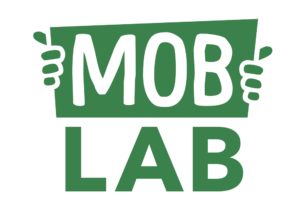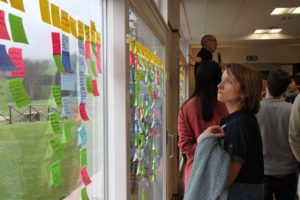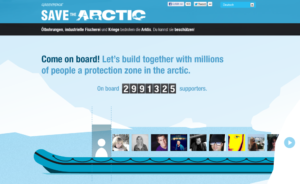Children four to 12 years old keep their coats on in their small elementary school classroom. The school in Stropones, Greece, is old, drafty, and has heating oil requirements above its budget.
Many of the children return home to the same situation — their families cannot afford to heat their homes, either, which often lack proper insulation. In desperation, some citizens are turning to dangerous heating options, which is contributing to smog that can be seen, felt and smelled.
It’s a problem felt across Greece in the cold, winter months. But rather than starting with a national energy efficiency and retrofitting project, Greenpeace started local — embarking on a two-month crowdfunding campaign to retrofit the school. Why choose a small school, rather than directly target the big issue? Did the campaign meet its crowdfunding goal of €40,000? Did they successfully affect the debate around the issue? What’s next for the campaign? MobLab caught up with Greenpeace Greece’s Dimitris Ibrahim and Lena Karvounaki to find out.
A Small School Sets A Big Example
Four million houses in Greece lack basic insulation because standards were not in place before the 1980s. Temperatures in some houses are as low as five degrees Celsius. Yet, during a financial crisis the government is willing to spend millions of euros building motorways, says campaigns co-ordinator Dimitris.
In order to show people the potential of energy efficiency, Dimitris says Greenpeace Greece thought the best way forward is to let people visualize it and draw public attention to something that has social value. While the campaign, called Everybody Likes it Hot, has not been using the political issues as its top-line messaging, retrofitting the small school aims to set an example to the Greek government.
“Everybody can relate to energy poverty, everybody can relate to cold houses and to not being able to afford your heating oil expenses or your electricity needs,” says Dimitris. “This is why we decided to use something that has a clear social value, like a school, and bring the community around it.”
Through the school example, people could see that energy efficiency is “probably the most sustainable and the cleverest investment that you can have in Greece at the moment,” he adds. Investing in energy efficiency provides more jobs and less dependence on imports, and allows people to feel good in their homes.
The government provides an annual oil-heating subsidy to poor households, which is linked to a sense of humiliation, philanthropy and charity, says Dimitris. The campaign focuses on values that resonate with the Grecians: dignity, independence, and pride.
“We aren’t even talking about the environmental benefits, we were talking about how people would be independent, how people would be living happily in their houses and how the quality of life would be much better,” says Dimitris.
“We knew that although we are a very proud nation our pride has fallen because of all these issues, there is a need for feeling independent and free again,” he says, noting they wanted to inspire optimism.
The retrofit wasn’t something that Greenpeace did, rather, it was the public who provided the funds. The project serves as an example of a realistic process that can be brought to the market and create new jobs while allowing people to sleep better in their homes, notes Dimitris.
The school retrofit included heat insulation, replacing frames and glass panes, replacing the oil boiler with a new biomass pellet boiler and conducting an energy audit before and afterwards.
The campaign is taking a different approach than a typical Greenpeace campaign. It is “more a mobilisation project,” Dimitris notes, focusing on pubic engagement with very tangible and visual actions.
Community Rallies Around Crowdfunding Platform
Greenpeace Greece drew on its previous crowdfunding success and launched the crowdfunding campaign with a €40,000 goal. With the potential for snow to start soon, the project was urgent to complete. Within two months, Greenpeace Greece saw groundbreaking numbers:
- 2,004: Donations, totaling €43,820
- 65: Percent of the donors who came to GP Greece from the Arctic 30 campaign
- 72: Percent of donors who were first-time Greenpeace donors
- 45: People who donated twice
- 202: Donors from out of country
- 73: Average open rate on e-mails within this campaign
The crowdfunding campaign started late last year during the same period as the Arctic 30 campaign, which was aiming to free 28 Greenpeace activists, a freelance photographer, and a freelance videographer, all detained in a Russian jail following a peaceful protest.

Donations from 2,004 people surpassed the fundraising goal, enabling the retrofit project to move forward.
While it may seem like it would be difficult to communicate about the retrofit campaign given the organization’s focus on the Arctic 30, people actually came to the campaign because of the international situation.
For people who were inspired by the bravery of the Arctic 30 activists, the Greece project was “the perfect next thing,” says Lena, converged media and digital mobilisation co-ordinator. Of the 2,004 supporters, 65 percent had first signed up for the Arctic 30 campaign and then donated to the school project as a next step.
The crowdfunding platform webpage was the same point of reference for a variety of online and offline activities. An initial promotional video featured famous Greek actor Gerasimos Gennatas as he visited the school. The actor followed the school story, as an audience member would, through four online videos.
Greenpeace Greece utilized a variety of mobilisation tactics including online promotion and combining traditional media tactics with Facebook and Twitter promotion. Thirteen celebrities were engaged through Twitter, where they helped spread the message. The organization also used advertising, as social messaging in the country is broadcasted for free on the radio.
Lessons Learned
Among the lessons Dimitris and Lena shared from the campaign are:
- Think about your audience’s values. What you hope will resonate with an audience might not if it doesn’t resonate with their values. Consider what is important to people. For example, while energy efficiency is important due to climate change, for some energy efficiency resonates because it alleviates concerns about ensuring their children’s homes have heat.
- Consider “unusual alliances.” Building connections and bridges with people who may not share your agenda but have some common values and interests may prove beneficial for the campaign – and for longer-term success.
- Use “big listening” skills. It is important to listen to what people are saying and doing. The campaign used many new media and communication tools to monitor the hot topics and social discussions. The intent was to not only ride the wave, but to raise it, says Dimitris. For example, Greenpeace Greece listened to a discussion about smog and steered the discussion to see smog as a symptom to the larger issue of fixing the country’s buildings. Time and energy is saved through picking up the public discussions.
- Create tangible, relatable outcomes. Lena attributes the successful crowdfuding response to the way the campaign project was setup: using a real example that is tangible for people to grasp and see how a problem can be addressed.
Creating Sustainable Solutions: Impact and Next Steps
Before the retrofit, the school required five tonnes of heated oil per year costing approximately €6,500. After the retrofit, annual heating costs using biomass pellets is €1,200.
The government ministry reacted for the first time during the campaign and announced retrofitting programs for schools in areas most affected by the cold.
With elections approaching in Greece, Dimitris says the campaign aims to create a race between the political parties for who is more in favor of energy efficiency and how far they will take the discussion around retrofitting buildings.
Of the country’s four million buildings, 2.7 million don’t have basic insulation. The government has stated a goal of at best having 250,000 buildings insulated by 2020. Greenpeace Greece is looking for at least one million.

A before and after photo shows the school’s retrofit changes, including: adding heat insulation, replacing frames and glass panes, replacing the oil boiler with a new biomass pellet boiler and conducting an energy audit before and afterwards.
“Politically, what we are aiming for is to create this critical mass of individuals and municipalities in local communities that demand energy efficiency not only as an environmental demand but also as an investment option,” says Dimitris.
Greenpeace Greece is creating a new, people-centered online grassroots campaigning platform that will be launched soon. The platform encourages citizens to create their own campaigns asking the government to “invest in me,” meaning into their homes and the values of pride, independence and quality of life.
The campaign will be using positive language and will not be confrontational, which is a different tact than other Greenpeace campaigns, Dimitris notes.
The platform, which will be mirrored off Greenpeace India’s Greenpeace Extra, or, at a very different scale, 350.org’s Fossil Free campaign, has toolkits and guides people through creating their own campaign. Greenpeace Greece is looking to engage the community that supports energy solutions and see them create their own local campaigns encouraging mayors to support the issue, says Lena.
When Everybody Likes it Hot went public, Greenpeace Greece received many calls from individuals and schools looking for support to start this kind of work.
“We know there is interest and we know it is going to be successful,” Dimitris says.
Stay connected: @lena_karv @greenpeace_gr @Oikolopaidi
Related Posts:
In Greece, crowdfunding is more than a fundraising tool
Breaking silos doesn’t have to hurt
Do you have an innovation in mobilisation and people-powered campaigns? Share it with Mob Lab by contacting moblab@greenpeace.org.




